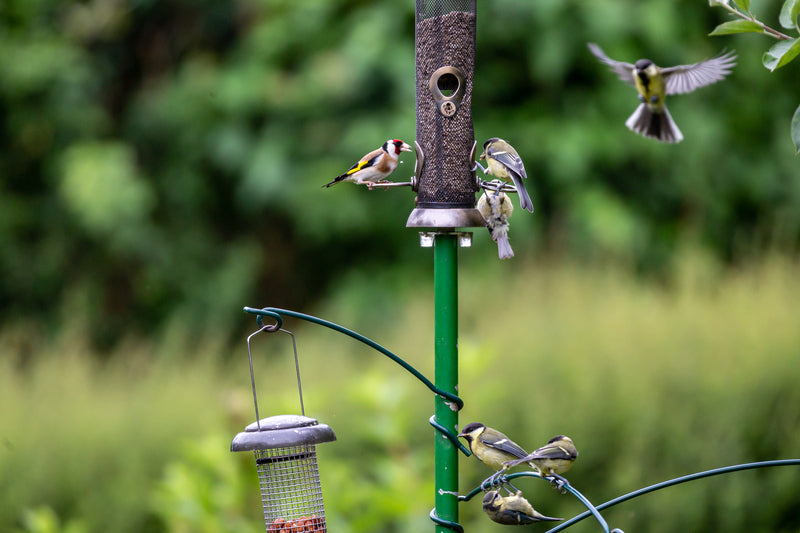
How to Feed our Garden Birds
Feeding garden birds is more than just a delightful way to bring nature closer to our homes; it plays a crucial role in supporting local wildlife. By providing the right food, we can help maintain healthy bird populations and contribute to the broader ecosystem. Here's why what we feed our garden birds matters:
1. Supporting Bird Health and Survival
Birds face numerous challenges throughout the year, from harsh winters to breeding seasons. By offering a consistent food supply, we help them survive these tough periods. For instance, high-energy foods like suet and sunflower seeds are vital during winter when natural food sources are scarce¹. In spring and summer, protein-rich foods such as mealworms support birds in raising their young².
2. Promoting Biodiversity
Different bird species have varied dietary needs. By providing a range of foods, such as seeds, fruits, and insects, we attract a diverse array of birds to our gardens². This diversity is beneficial as it helps maintain a balanced ecosystem. Birds play essential roles in pest control, pollination, and seed dispersal, all of which contribute to a healthy environment³.
3. Creating Wildlife Corridors
When multiple gardens in a neighborhood provide food, water, and shelter, they form essential corridors for wildlife. These corridors allow birds and other animals to move safely between habitats, increasing their chances of survival and reproduction³. This connectivity is especially important in urban areas where natural habitats are fragmented.
4. Preventing Disease Spread
It's crucial to maintain clean feeding stations to prevent the spread of diseases among bird populations. Regularly cleaning feeders and water bowls reduces the risk of infections, ensuring that the birds visiting your garden remain healthy¹. Additionally, rotating feeding areas can help minimize the buildup of pathogens.
5. Encouraging Natural Behaviors
Feeding birds in a way that mimics their natural foraging habits encourages them to exhibit natural behaviors. For example, scattering food on the ground can attract species like blackbirds and robins, which prefer ground feeding². Providing a variety of feeding options, such as hanging feeders and bird tables, caters to different species and their unique feeding preferences.
6. Educational and Therapeutic Benefits
Feeding garden birds offers educational opportunities for all ages. Observing birds can teach us about their behaviors, diets, and the importance of conservation. Moreover, birdwatching is known to have therapeutic benefits, reducing stress and promoting mental well-being.
What Not to Feed Garden Birds
While feeding birds can be beneficial, it's equally important to avoid certain foods that can harm them:
1. Salted and Dry Roasted Nuts: Birds cannot metabolize salt, which can lead to dehydration and other health issues¹. Always provide unsalted nuts.
2. Dairy Products: Birds lack the enzyme lactase, which means they cannot digest lactose found in dairy products. This can cause digestive problems¹.
3. Chocolate: Chocolate contains theobromine, which is toxic to birds and can cause serious health issues³.
4. Table Scraps: Many table scraps contain oils, spices, and other ingredients that are harmful to birds. Additionally, they can attract unwanted pests like rats³.
5. Moldy or Spoiled Food: Moldy food can harbor harmful bacteria and toxins that can make birds sick³.
6. Bread: While not immediately harmful, bread offers little nutritional value and can fill birds up without providing the necessary nutrients they need⁴.
7. Raw Peanuts: Raw peanuts can contain aflatoxins, which are toxic to birds. Always ensure peanuts are fresh and free from these toxins².
The Impact of Pesticides in Birdseed
Birdseed grown using pesticides can have detrimental effects on bird populations and the broader ecosystem. Pesticides, particularly neonicotinoids, have been linked to declines in bird populations². These chemicals can reduce the availability of insects, which are a crucial food source for many bird species, especially during breeding seasons².
Moreover, seeds treated with pesticides can directly harm birds. For example, neonicotinoids, commonly used as seed coatings, can be absorbed by plants and persist in the environment, affecting birds that consume these seeds². Studies have shown that exposure to these pesticides can lead to reduced reproduction rates and increased mortality in birds².
To support bird health, it's best to choose organic or pesticide-free birdseed. This not only helps protect the birds but also promotes a healthier environment overall.
Conclusion
Feeding garden birds is a simple yet impactful way to support our local wildlife. By providing a variety of foods and maintaining clean feeding stations, we can help ensure the health and diversity of bird populations. In turn, these birds contribute to a balanced and thriving ecosystem, benefiting all forms of life. So, next time you fill your bird feeder, remember that you're playing a vital role in nurturing nature right in your backyard.
---
Do you have a favorite bird that visits your garden?
¹: [Homes & Gardens](https://www.homesandgardens.com/gardens/what-not-to-feed-birds)
²: [Smithsonian Magazine](https://www.smithsonianmag.com/science-nature/popular-pesticides-linked-drops-bird-population-180951971/)
³: [Homes & Gardens](https://www.homesandgardens.com/advice/feeding-birds-in-winter)
⁴: [RSPB](https://www.rspb.org.uk/helping-nature/what-you-can-do/activities/open-a-bird-cafe)
Source: Conversation with Copilot, 19/09/2024
(1) 30-year bird watch reveals devastating impact of pesticides and .... https://www.soilassociation.org/news/2023/may/17/30-year-bird-watch-reveals-devastating-impact-of-pesticides-and-fertiliser-use-on-wild-bird-populations/.
(2) Popular Pesticides Linked to Drops in Bird Populations. https://www.smithsonianmag.com/science-nature/popular-pesticides-linked-drops-bird-population-180951971/.
(3) Pesticides in Bird Seed? Scotts Miracle-Gro Fined $12.5 Million. https://www.audubon.org/news/pesticides-bird-seed-scotts-miracle-gro-fined-125-million.
(4) Lawn Pesticides and Birds: Tips for Safe, Bird-Friendly Gardening. https://abcbirds.org/blog/bird-friendly-gardening/.
(5) Getty Images. https://www.gettyimages.com/detail/photo/crop-sprayer-royalty-free-image/833284634.
